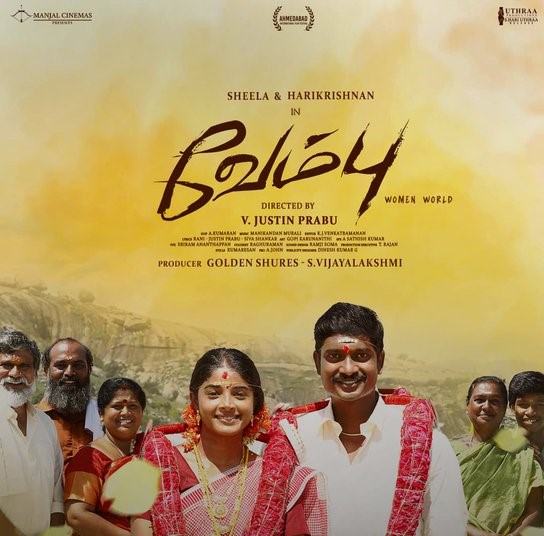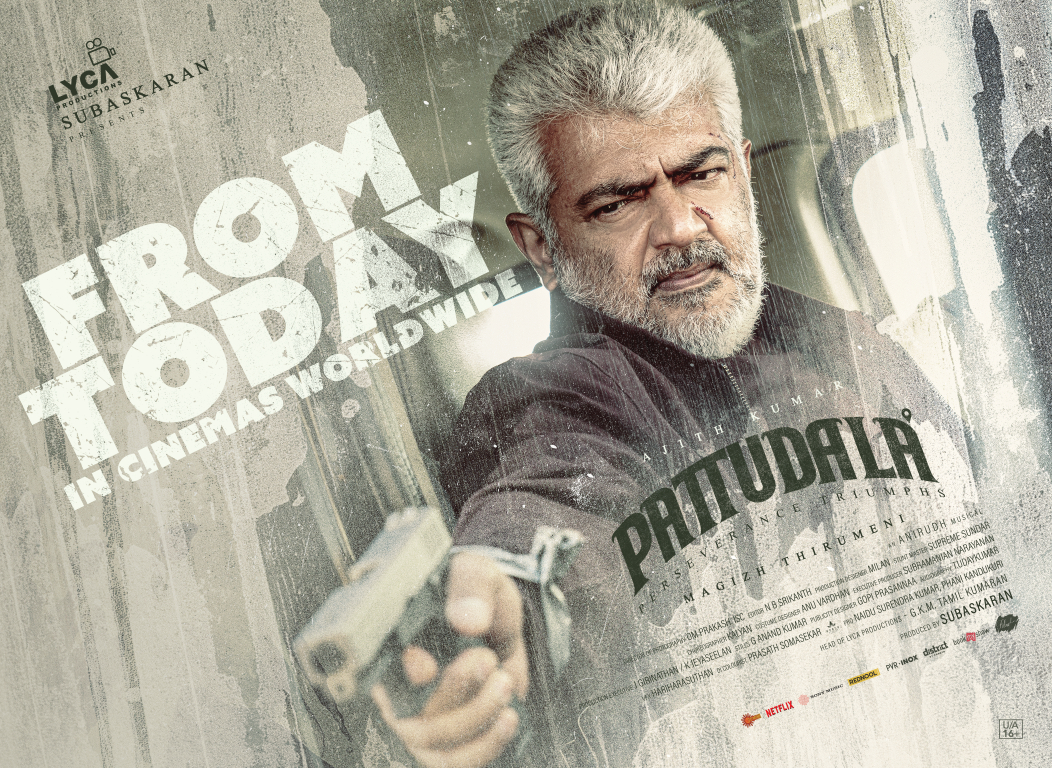Vembu Movie Review
Vembu is a film produced by Golden Suresh and S. Vijayalakshmi under the banner of Manjal Cinemas.
This film is directed by debut director V. Justin Prabhu, starring Harikrishnan (who appeared in 'Madras' as Johny, 'Thangalaan', and 'Kabali') as the hero, and Sheela (from 'Toilet' and 'Mandela') as the heroine. Marimuthu, Jayarav, and Janaki (who appeared in 'Pariyerum Perumal', 'Karnan', and 'Vaazhai') play important supporting roles.
A. Kumaran, who handled cinematography for this film. Manikandan Murali, who composed music for 'Atho Mukham' and G.V. Prakash's 'Raphael', has composed the music. KJ Venkatraman, has handled the editing. Ramji Soma, has done the sound mixing. The film revolves around themes of women's self-protection and having the right male companion as support.
The story is set in a small village in Krishnagiri district. Vembu is the daughter of a man who works at the village brick kiln. She is currently studying in college and has a great passion and talent for Silambam (a traditional martial art). She has recently won first place in a district-level Silambam competition. The film's hero is Vetri (Harikrishnan), who is Vembu's cousin. He runs a photo studio in the village. There's friendship between them, and Vetri harbors romantic feelings for Vembu. However, Vembu has big dreams of achieving greatness in Silambam and participating in major competitions, for which she struggles and fights. Although Vembu's father, who works as a daily wage laborer at the brick kiln, knows about her dreams, he feels compelled to arrange her marriage due to the village's social expectations and way of life.
Initially, Vembu refuses, but later, for her father's happiness and tears, she agrees to marriage, postponing her dreams. However, on the night of her wedding, a major catastrophe strikes her life, turning everything upside down. What is this catastrophe? Does Vembu escape from it? What happens to her Silambam dreams? This forms the screenplay of 'Vembu'.
Sheela, who has consistently acted in feminist-themed films, has taken on the beautiful character of 'Vembu' and given tremendous strength to this film. Though she repeatedly tells everyone - her father, mother, aunt, relatives, and grandmother - that Silambam is her dream, the speed and pride she shows while performing Silambam are clearly visible on her face.
Her portrayal of loving Vetri in her heart but being unable to express it, putting aside love for her dreams, creates an engaging internal conflict. The small actions she shows in song sequences, as if love ultimately wins in the debate of "love or Silambam," make her very enjoyable to watch. After the interval, her resilience in supporting her husband Vetri and realizing that she must now shoulder the family's burden creates touching moments that bring tears to our eyes. When she asks Vetri, "Can I go to work, uncle?" showing her readiness to bear the family's burden, and when she suffers while trying to earn money by displaying her Silambam skills as entertainment, Sheela evokes deep sympathy. Until the end, Sheela has undoubtedly also become the hero in several scenes.
Harikrishnan, playing Vetri, though he might say "I'm not an acting demon," has earned our sympathy through his pathetic dialogues and expressions in post-interval scenes, rolling his eyes repeatedly. His scenes of desperately wanting to confess his love to Vembu are also enjoyable. Similarly, when he sits pitifully at home and emphasizes that Vembu shouldn't give up her Silambam dreams, we feel that Vembu is blessed to have such a husband.
Supporting Cast: Sheela's father has beautifully and precisely performed even small details, captivating us greatly. Particularly, the scenes where he comes home crying upon learning that his daughter performed Silambam in front of all the villagers for money truly touch our hearts with his natural acting. Both Vembu's mother and Janaki (Harikrishnan's mother) have acted very naturally and realistically in emotional scenes, competing with each other. Marimuthu, who played the MLA, is an excellent actor, but he shouldn't have exited so quickly. He has beautifully concluded the film by doing exactly what the director asked in his MLA character. Since the film was shot entirely in mountainous regions, they have beautifully captured natural scenic shots. Kudos to the cinematographer.
The song "Ele Ponamma" still rings in your ears. The other songs are also pleasant to listen to. The background music composer has been a bit heavy-handed.
Being a small-budget film, it's clear that many scenes have been omitted. However, it's very disappointing that the essential sentimental scenes that should have been there when Hari gets his old life back are missing. Even for such small-budget films, certain scenes are unavoidable. It seems they had no choice but to skip them, but we criticize the director for this reason.
In today's times, it has become essential for women to know some form of self-defense, whether in villages, cities, or metropolitan areas. This is necessary because their enemies are increasing day by day. Self-defense is a weapon that instills self-confidence in women. It will definitely help them someday in their lives. In this regard, this film serves as an inspiration for women, boosting their self-confidence.
Education is always an essential need for women. This film clearly states, both indirectly and directly, that the foundation for their life's progress is the education they receive.
 Our heartfelt congratulations to director Justin Prabhu, who has written the story, screenplay, and dialogues and directed this excellent film. The director has created this film excellently to the best of his ability. Kudos to his direction. All actors and actresses have been made to perform excellently. Our congratulations to all the actors and actresses.
Our heartfelt congratulations to director Justin Prabhu, who has written the story, screenplay, and dialogues and directed this excellent film. The director has created this film excellently to the best of his ability. Kudos to his direction. All actors and actresses have been made to perform excellently. Our congratulations to all the actors and actresses.




